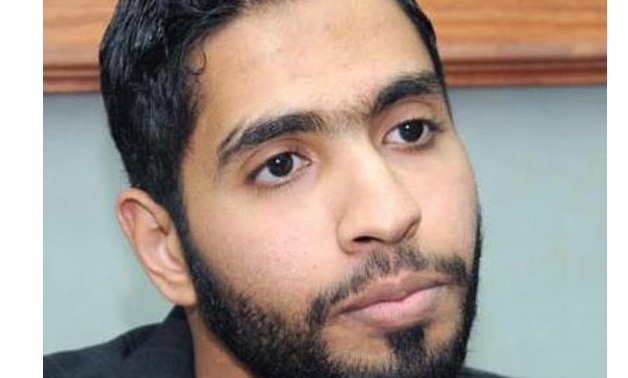
Abdel Rahman Ezz- File photo
CAIRO – 16 August 2017: Abdel Rahman Ezz is a leading member of the outlawed Muslim Brotherhood. He is best known for being one of the founders of the April 6 movement, established in 2008, before being rejected by many of the movement’s members due to his eccentric ideas, which is why he joined a more radical organization: the Muslim Brotherhood.
Ezz, 30, also participated in violent acts after the revolution, most notably the events of Mohammed Mahmoud, as well as the events of the Ettahadiya Palace. On social media, Ezz also incited murder and violence.
According to the General Prosecution, Ezz is charged with shooting security personnel during the events of the Ettahadiya Palace and with helping Brotherhood snipers zero in on police officers and shooting them by pointing at them with a laser pen.
 Abdel Rahman Ezz Twitter
Abdel Rahman Ezz Twitter
Ezz worked as a reporter for the Muslim Brotherhood-affiliated Rassd news network, and a TV presenter for Muslim Brotherhood TV channel 25. He also worked for Al-Dostour newspaper.
Ezz was briefly detained by the International Police (Interpol) at Berlin Schoenefeld Airport on Tuesday but was released shortly after broadcasting live Facebook videos.
This came after an arrest warrant sent by the Egyptian Interior Minister to the Interpol.
Ezz posted a video on his Facebook account, calling on human rights organizations and global media to intervene and help save him.
A verdict against Ezz was issued in Egypt, where he was sentenced to 20 years in prison and placed under police surveillance for five years. Ezz is charged with inciting violence, burning police stations, and imprisoning and torturing 49 detainees during the Ithadeya events.
In July 2014, Ezz fled to Qatar with his family like other Brotherhood leaders who face national security charges.
Ezz is listed on the top wanted-persons list by the Egyptian security apparatus on charges of inciting violence, destabilizing national order and disturbing the national security.
 Abdel Rahman Ezz Twitter
Abdel Rahman Ezz Twitter
On April 2, 2014, Ezz described the three blasts that broke out outside Cairo University, which killed one police officer and injuring five others, as “suicide attacks against (occupation) police and military.”
Ezz posted on Facebook, saying, “whenever a suicide operation happens by Islamic resistance youth against police and military of occupation, I remember the intimidation of women, youth and children in Rabaa al-Adaweya and Nahda when the massacre happened, and body parts were everywhere, the massacre of the prison truck and the following massacres that lasted seven months.”
“Bless the hands that shed the blood of my military,” he said in reference to terrorists’ attacks targeting the Egyptian army.
“This is in retaliation to the students of Al-Azhar University and Cairo University who were killed by the police and military over the nine months,” Ezz added.
Following a blast by the outlawed Muslim Brotherhood at Lebanon Square in Giza on April 18, 2014, the Brotherhood activist wrote on April 20, 2014, on his Facebook account, “the recent operation was made by the Ajnad Masr group.”
“To all free citizens, some honorable men still exist and feel the same pain you suffer because they are like you, and they pledge to take revenge from criminals, tyrants and killers. We will move on,” Ezz added.
In June 2015, Al-Jazeera anchorman Ahmed Mansour was also arrested in Germany. However, Qatar and the Muslim Brotherhood intervened to pressure the German government, to which he was later released.


Comments
Leave a Comment